
Question 1 (Is greed enough?) A group of financial traders faces the risk of a market downturn and is considering investing in two financial assets. There is a single physical good, and assets pay in units of this good, which we will call "dollars' ($). Asset 1 pays $1 in case the market keeps growing, but loses $1 otherwise. Asset 2 pays $2 in the first scenario, but loses $2 otherwise. You can assume that no other scenario is relevant for the trading period considered. No investor has capital to invest today, but each will receive some capital w = w'>0 in all scenarios s tomorrow. No other asset is available to them for trade at the moment. Let q be the price of asset k = 1,2 today. a) Write down the traders' budget constraints today and tomorrow. Let U(x)=lnx, be the expected) utility of any trader in this market. b) If q = 92 =7>0 what is the optimal investment each trader makes? c) Can q = 92 = 7 > O be an equilibrium in this market? "If the marginal utility of consumption today is positive, then the Law of One Price holds." d) Does the Law of One Price apply in this market? Explain how your conclusion relates to the statement above: Does the statement hold in this market? After making a few phone calls, all traders are able to gain access to a call option on asset 2, with exercise price 1 and price qc. e) Can q = 92 = 7>0 still be an equilibrium in this market? "If the Law of One Price holds, then the marginal utility of consumption today is positive." f) Comment on the validity of the previous statement: is it true or false? Question 1 (Is greed enough?) A group of financial traders faces the risk of a market downturn and is considering investing in two financial assets. There is a single physical good, and assets pay in units of this good, which we will call "dollars' ($). Asset 1 pays $1 in case the market keeps growing, but loses $1 otherwise. Asset 2 pays $2 in the first scenario, but loses $2 otherwise. You can assume that no other scenario is relevant for the trading period considered. No investor has capital to invest today, but each will receive some capital w = w'>0 in all scenarios s tomorrow. No other asset is available to them for trade at the moment. Let q be the price of asset k = 1,2 today. a) Write down the traders' budget constraints today and tomorrow. Let U(x)=lnx, be the expected) utility of any trader in this market. b) If q = 92 =7>0 what is the optimal investment each trader makes? c) Can q = 92 = 7 > O be an equilibrium in this market? "If the marginal utility of consumption today is positive, then the Law of One Price holds." d) Does the Law of One Price apply in this market? Explain how your conclusion relates to the statement above: Does the statement hold in this market? After making a few phone calls, all traders are able to gain access to a call option on asset 2, with exercise price 1 and price qc. e) Can q = 92 = 7>0 still be an equilibrium in this market? "If the Law of One Price holds, then the marginal utility of consumption today is positive." f) Comment on the validity of the previous statement: is it true or false







